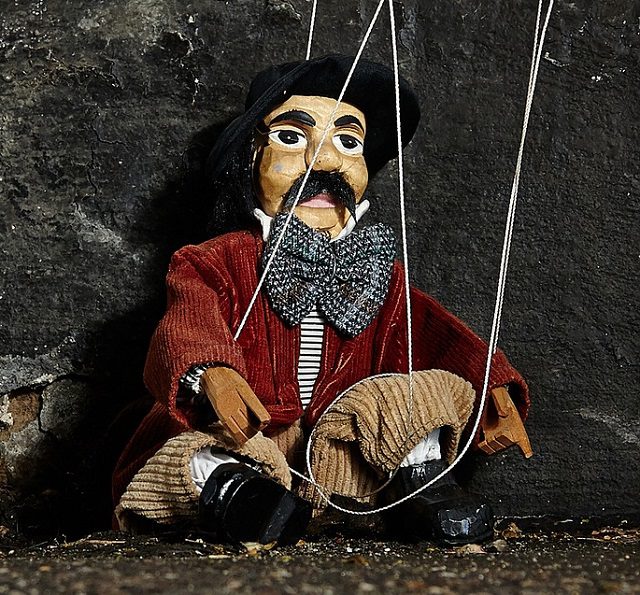
It’s Ross Douthat who is being used as a puppet of the devil, not Pope Francis.
There are many “blessings” that flow from the current slew of best-selling pope-bashing books: Phil Lawler’s Lost Shepherd (see my many articles on that) and Ross Douthat’s To Change the Church: Pope Francis and the Future of Catholicism, that I specifically address now:
1) They help to undermine the faith of the average Catholic (whether they think logically or consistently about it or not) in Catholic ecclesiology, the institution of the papacy, infallibility, and indefectibility. Thus (mark my words) they will lead to many abandoning the Church.
2) They undermine the traditional characteristic of reverence and deference towards the pope, as the leader of the Church, which follows scriptural injunctions concerning honor and respect towards rulers and leaders.
3) By undermining the papacy, indirectly, other Catholic doctrines also become implicated. The relatively unsophisticated Catholic in the pews (and pubs) starts to question things, because he or she hears the false rumors that even the pope has done so.
4) They make a laughingstock out of the Catholic Church, since even non-Catholics know that the pope (and his office) ought not be treated with such contempt; and it is a disgraceful, utterly unseemly outward display to the watching world. As such, it works against people seriously considering becoming Catholics.
5) And it confirms Protestants and Orthodox in their mistaken views that the papacy is unbiblical, and a non-necessary office in the first place.
The first thing Martin Luther did when he decided to go his own way and revolt against the Catholic Church was attack the pope. And he did so with lies, talk of the “antichrist” and scurrilous mocking illustrations. This approach remains a key trait of anti-Catholic rhetoric, lies, and polemics to this day. The last thing I did before yielding up my own strong evangelical Protestantism and bowing to the wisdom of the ages in the Catholic Church, was fight ferociously against papal infallibility, as I have written about in great detail.
The latter is very close to the heart of any educated Protestant, because it is utterly contrary to their rule of faith: sola Scriptura. In that view, Scripture Alone is the infallible source of faith. That means that tradition and popes are not infallible. This is why Luther, early on, in his debates (in 1519), went after infallibility. He knew it was a central issue.
The devil’s victory today is that he has Catholics inside the Church doing the work traditionally reserved for non-Catholic critics (i.e., they are “useful idiots”). He just sits back and enjoys himself to no end, watching the stupidity and gullibility of Catholics, and laughing and mocking us to scorn. Now we have the pathetic spectacle of millions of Catholics judging and lying about the pope, gossiping about him and trashing him on a regular basis.
And so, as I confidently predicted, now we are seeing Protestants rejoice in these pope-bashing books, and noting that they back up their own claims of skepticism towards the very office of the papacy. Evangelical Protestant Collin Hansen, editorial director for The Gospel Coalition, wrote an article, entitled, “What If Pope Francis Isn’t Catholic?” (3-20-18), which was a review of sorts, of Douthat’s To Change the Church. It’s actually a fairly well-argued, measured, temperate piece (far more so than 90% of the pope-bashing trash that we are getting today from fellow Catholics).
He’s simply being a consistent evangelical. It’s the Catholics who are being inconsistent and hypocritical, and thinking much like evangelicals. If I were reading the same pope-bashing stuff in 1990, when I was seriously considering conversion, and railing against papal and conciliar infallibility as self-evident absurdities, I would have had a field day with it: stuffing it into my Catholic friends’ faces. It would have been my Exhibit #1 in the group discussions in my home that led to my conversion.
Perhaps I wouldn’t have even become a Catholic (at least not in that year). After all, I was so stubborn that it took Cardinal Newman’s ultra-sophisticated historical arguments about development of doctrine to bring me to my senses and admit defeat in debate.
So what does evangelical Hansen conclude, in reading such a book? Here is how he sums it up:
Not that he intended to do so, but I don’t think Douthat could’ve written a better apologetic for Protestant arguments against the papacy.
There you go, folks. This is supposed to be something that will edify Catholics and persuade Protestants to join us? It will have exactly the opposite effect. Even if the arguments in it were true and factually correct (they are not), it would have the same effect. But it’s all the more tragic that it will cause such skepticism and abandonment, being a pack of lies about the Holy Father. Here is how Hansen describes the outrageous premises of Douthat’s volume:
What if Pope Francis isn’t Catholic? What if he aims to overturn centuries of dogma? What if he plans to stack the College of Cardinals with liberal allies who will ensure his revolution can’t soon be reversed? What if he banishes his conservative critics to the church’s periphery? Who, then, will enforce the teaching on sexuality and marriage preserved against Western cultural trends by the late Pope John Paul II and self-titled Pope Emeritus Benedict XVI? Indeed, how can the vicar of Christ so confidently dismiss the words of Christ on marriage and adultery from the Gospels?
Yeah, what if? And what if none of these charges are true, as I and many others have, I think, shown again and again? What then? How would we get the genie back in the bottle? How would we unscramble that egg? It would be the perfect Satanic storm. I critiqued Douthat’s own severe flaws in thinking a little over two years ago, before this book was ever heard of.
At that time, Douthat said that “Francis is not a theological liberal.” He was mostly critiquing his economic and social views (it’s the typical regrettable either/or dichotomy between the Church’s doctrinal and social teaching), and contending that he was too lax against the liberals in the Church.
Douthat lacked faith in the indefectibility of the Church already by then, and he bashed Vatican II, which is the second of the three hallmarks of the radical reactionary Catholic (the other two being pope-bashing and ordinary form / Pauline Mass-bashing). Thus, the stage was set for his current no-holds-barred attack against the pope. He wrote:
Conservative Catholics need to come to terms with certain essential failures of Vatican II. For two generations now, conservatives in the Church have felt a need to rescue the real council, the orthodox council, from what Pope Benedict called “the council of the media.” . . . the council as experienced by most Catholics was the “council of the media,” the “spirit of Vatican II” council, and that the faithful’s experience of a council and its aftermath is a large part of its historical reality, no matter how much we might wish it to be otherwise. But its deliberations simply took place too soon to address the problems that broke across Catholicism and Christianity with the sexual revolution and that still preoccupy us now. Which is not to say that what the Church needs right now is a Council of Trent, exactly. The recent Synod on the Family suggests that, if attempted, the outcome would be either empty or disastrous.
In other words, he is thinking like a reactionary in two of three key respects. That’s the backdrop of his papal bashing now. I replied to this paragraph in my paper about him:
What has occurred is no more the failure of the council itself, than it is a failure of Pope Francis when the media and popular secular culture distort his view on a given subject. This is not an essential failure of Vatican II. Douthat seems particularly confused on this point: throwing out the baby with the bathwater. The misguided liberal “spirit of Vatican II” only proves that people delude themselves about the magisterium, and try to spin and distort it to the public. The fault for that lies on those who do it, not the council. Is this not utterly obvious?
I’ve documented how Phil Lawler was also starting to attack Vatican II itself. I’ve also demonstrated the heavy influence of past reactionary thinking in the signatories of the Filial Correction of the pope. Lawler — just like Douthat — questioned the authority of an ecumenical council (Vatican II). He did this in an article at his Catholic Culture site, dated 23 August 2017:
Did the problems that arose after Vatican II come solely because the Council’s teachings were ignored, or improperly applied? Or were there difficulties with the documents themselves? Were there enough ambiguities in the Council’s teaching to create confusion? If so, were the ambiguities intentional—the result of compromises by the Council fathers?
. . . the proponents of change can cite specific passages from Council documents in support of their plans. So are those passages being misinterpreted. Are they taken out of context? Or are there troublesome elements of the Council’s teaching, with which we should now grapple honestly? One thing is certain: we will not solve the problem by pretending that it does not exist.
This is classic reactionary thinking, folks. I know that, because I have studied the reactionary mindset closely for over twenty years. I have a major web page devoted to it (probably the most extensive from any orthodox Catholic), and have written not just one, but two books on the topic.
I’m doing my job as a Catholic apologist: studying serious errors within the Catholic milieu and warning people about them; showing how and why they are wrong. This sort of lack-of-faith, gossipy, fear-mongering mentality lies behind a great deal (not all) the current pope-bashing. The chain of thought, from one error to another, is clear as day.
Remember, Protestants deny that ecumenical councils are infallible, too, so once again, the pope-bashers exhibit another key trait of both radical reactionary, liberal Catholic, and Protestant thought: ecumenical councils can be questioned, and their results distorted and co-opted in plans to pervert their actual objective meanings (precisely what is being done now to the papal document Amoris Laetitia also). Hansen continues:
Douthat also repeatedly warns Francis against trying to remake the Catholic Church in the Protestant image. But conservative Protestants, at least, would actually recognize and support many of Douthat’s claims, . . .
How utterly ironic that statement is! It’s clearly Douthat who is thinking like Protestants and Catholic reactionaries (notorious for thinking like Protestants). After all, he is deliberately undercutting / questioning / bashing the authority of both a pope and an ecumenical council: both things that Protestants characteristically (and at least self-consistently) do. Luther attacked the pope and he attacked councils as self-contradictory (they “can and do err”: so said he at the Diet of Worms in 1521); therefore untrustworthy.
I noted sixteen days ago on my Facebook page that Protestants were being emboldened by Lawler’s book in the same way (“Thanks, Phil Lawler. Now the Anti-Catholic Protestants Are Taking Notice of Your Book and Mocking the Church as a Result”). This time it was the guy who runs the website, “excatholic4christ.” He wrote:
For centuries, Roman Catholics have proudly boasted to Protestants that their church alone was guided by the infallible “Vicar of Christ” and that the Holy Spirit would prevent any pope from leading the church into doctrinal error. . . .
This book is an absolutely incredible resource for evangelicals like myself who scrutinize the Roman Catholic church and have been observing this ongoing “Amoris” controversy. I read the entire book in only two sittings. We have not witnessed a similar crisis in our lifetime, as conservative Catholic clerics and lay leaders are absolutely bewildered by their pope and advising the laity to disobey him. My prayer is that this crisis will lead many Catholics to question the false claims once routinely made about their pope and the other man-made traditions of their church and to seek out the unchangeable Savior who offers them the Good News! of salvation by God’s grace through faith in Jesus Christ alone.
I also wrote about (on 2-22-18) how former Catholic Rod Dreher loves Phil Lawler’s book, too. Of course he does! It confirms his decision to leave the Catholic Church!
Douthat and Lawler precisely parrot Luther, dissident Catholics, and reactionary Catholics. And that’s why their books (not even getting to their innumerable errors and fallacies) are so outrageous and spiritually (even morally) dangerous to the flock, and to non-Catholics as well. Avoid them — and the gossip and trash-talk that invariably surrounds them, in comboxes and cocktail parties — like the plague, and warn others to do so as well.
***
Photo credit: Photograph by Kallistii (5-7-14) [Pixabay / CC0 Creative Commons license]
***













